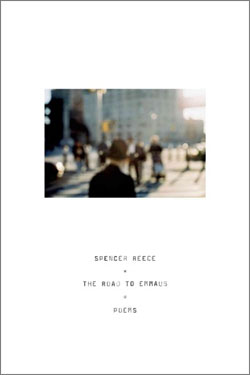
Poet and Episcopal priest Spencer Reece’s recent book, The Road To Emmaus (Farrar, Straus and Giroux, $24.00), is a warm and generous collection of narrative poems that explores life with humble insight and restrained brilliance.
Reece writes about his family’s history, a relationship formed in a coming-out support group, friendship with his AA sponsor, seminary life, and his experiences as a hospital and prison chaplain. Poetry about love and death and God risks succumbing to saccharine sentimentality, but Reece approaches these subjects with an honest clarity and gentle lyricism that is refreshing. Re-reading passages in preparation for this review, I found myself again and again being pulled into these poems, poems that after only a few readings already feel intimately familiar.
Lines such as these from the book’s opening poem “ICU” linger and haunt:
In the neonatal ICU, newborns breathed,
blue, spider-delicate in a nest of tubes.
A Sunday of themselves, their tissue purpled,
their eyelids the film on old water in a well,
their faces resigned in plastic attics,
their skin mottled mildewed wallpaper.
It is correct to love even at the wrong time.
On rounds, the newborns eyed me, each one
like Orpheus in his dark hallway, saying:
I knew I would find you, I knew I would lose you.
Reece’s poetry is accessible without being trite, full of evocative imagery, intriguing personalities, and compelling stories. This collection is a thoughtful exploration of the boundaries between the spiritual and the physical, between the past and the present, between the self and others. Each poem contains a careful measure of truth and beauty that is always engaging and often transcendent.
In the collection’s title poem Reece explores his complex relationship with his gay AA sponsor named Durell:
Hours before, while the moon’s neck wobbled on the Charles
like a giraffe’s, or the ghost of a giraffe’s neck,
I imagined Durell labored, having slept only a few hours,
caged in his worries of doctor bills, no money,
and running out of people to ask for it: mulling over mistakes, broken love affairs—
a hospital orderly, a man upstairs,
he probably mumbled unkind epithets about blacks and Jews,
even though the men he loved were blacks and Jews.
Some of his blasphemies, if you want to call them that,
embarrassed me in front of Sister Ann,
but she seemed unflappably tolerant.
Reece became a priest in middle age, and his poetry is informed by a contemplative spiritual maturity. He describes the beginning of this journey in the opening stanza of “The Upper Room:”
If you looked up, you might have seen me,
although few saw me in that room:
it required crossing the threshold
from the profane to the sacred,
a paradoxical proposition for most, including myself.
But I went in search of the transcendent in those days,
which required leaving a particular world for another.
It is never easy to abandon a world.
It was my second attempt.
This time I was much older
and the strident faiths of my younger colleagues
often gave me pause.
In “Hartford,” Reece asks, “But religion and poetry, can they ever be divided?” and then explicitly draws the connection between his chosen vocations:
A poet, like a priest, works with facts and mysteries: the facts mysterious, the mysteries factual.
This is an apt description of Reece’s poems: a potent mix of fact and mystery that is both satisfying and tantalizing.
Reviewing poems such as these is a futile task: reducing them to mere summaries and excerpts drains them of their subtle power. This is poetry that begs to be read and savored and read again. Reece’s collection is a quiet masterpiece, a spiritual and poetic achievement that speaks to the heart, mind, and soul.
You can find out more about Spencer Reece and read selections of his poetry at the Poetry Foundation.
 Dan Wilkinson
Dan Wilkinson
Dan is the Executive Editor of the Unfundamentalist blog. He is a writer, graphic designer and IT specialist. He lives in Montana, is married and lives with two cats.

Leave a Reply